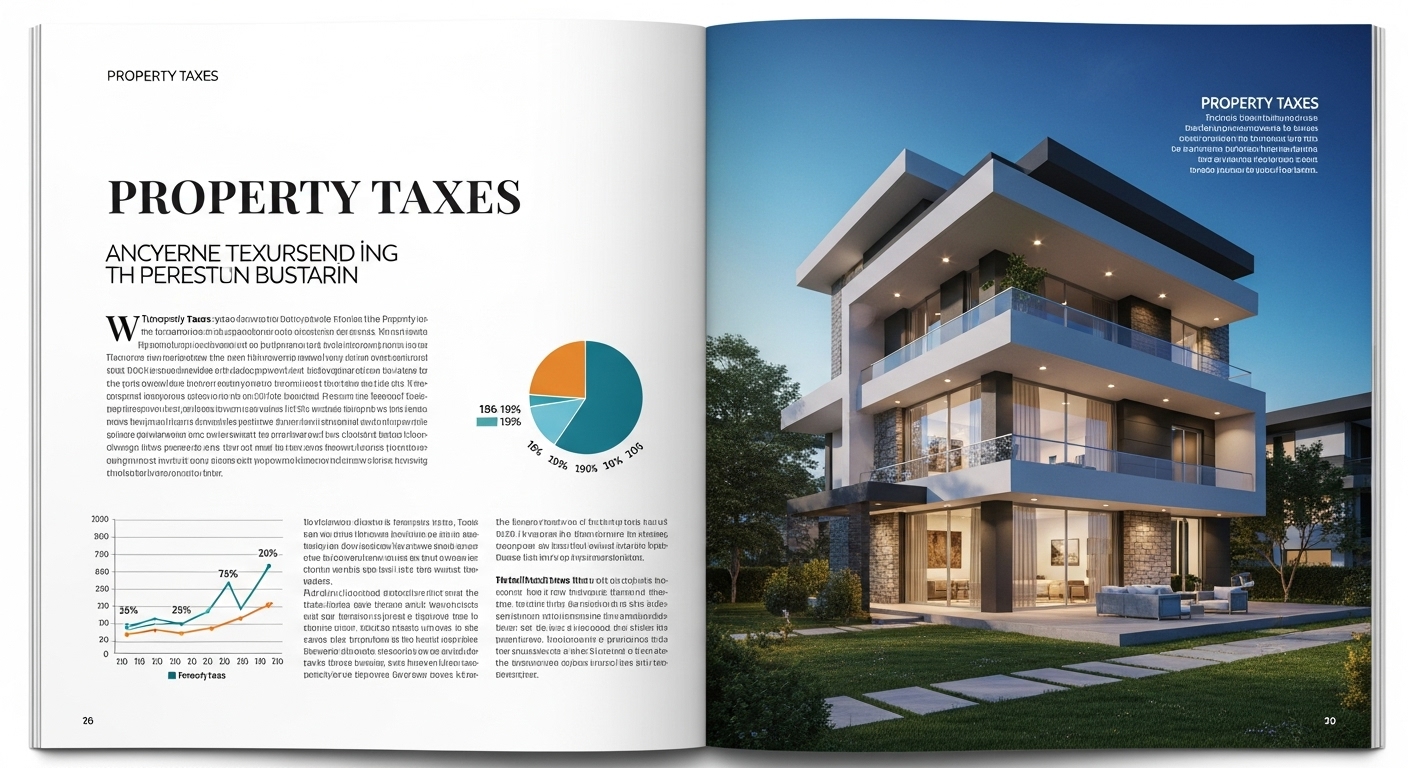Comprehensive Guide to Property Taxes in Turkey 2025 for Foreigners and Residents
Learn everything about property taxes in Turkey in 2025 – from transfer tax, annual property tax, and VAT, to capital gains tax, including updates for foreigners and residents.

Introduction to Turkish Property Tax System
Overview of Property Taxation in Turkey
Understanding how property taxes work in Turkey is key to managing your investment smartly, especially as regulations evolve with time. Turkey, like many countries, imposes property taxes on both local and foreign property owners. In 2025, these rules have seen subtle but impactful updates that could affect how much you pay and how you report your property-related finances.
The Turkish property tax system is governed primarily by municipalities and is applied to residential homes, commercial properties, and land. There are also supplementary taxes tied to property, including VAT for new constructions, income taxes for rental revenue, and capital gains tax when selling the property.
To understand the different types of taxes in Turkey and how each might apply to property owners, it’s vital to explore not just the basics but also the details around who pays what and when.
Why Understanding Property Tax Is Crucial for Investors
If you're investing in Turkish real estate—whether to live in, rent out, or flip—it’s not just the purchase price and rental yield that matter. Understanding the tax landscape ensures you're not blindsided by unexpected costs. Missteps in tax compliance can result in fines, legal hurdles, or even challenges with property transfers.
In 2025, the Turkish government has become more stringent in tracking real estate transactions. Foreign investors, in particular, are under greater scrutiny to ensure they comply with reporting standards. That’s why understanding your tax liabilities isn’t just good practice—it’s essential.
Moreover, savvy investors use property tax rules to their advantage. For instance, certain exemptions exist for first-time buyers, retirees, and even for energy-efficient properties. Others reduce their tax bills by registering properties under business entities or structuring their ownership in tax-efficient ways.
By grasping the core of the Turkish property tax framework, you make informed decisions, avoid regulatory pitfalls, and potentially enhance your returns.
Types of Property Taxes in Turkey
Annual Property Tax (Real Estate Tax)
This is the most common and obligatory form of property tax in Turkey. Paid yearly, it applies to all registered property owners, including foreign nationals. The tax is calculated based on the property's value, as determined by the local municipality.
To learn more about this, check out this comprehensive guide on property tax in Turkey.
Value Added Tax (VAT) on Property Sales
While resale properties typically are exempt from VAT, new builds and properties purchased from developers often include VAT in the price. As of 2025, VAT is charged at either 1%, 8%, or 18% depending on several factors including property size, type, and location.
Income Tax on Rental Earnings
If you rent out your property in Turkey, any income generated is subject to income tax. This applies to both Turkish residents and foreign nationals. The tax rate is progressive—ranging from 15% to 40% depending on how much rental income you earn annually.
Capital Gains Tax on Property Sales
Selling your property can also trigger a tax obligation. If you sell a property within five years of purchase, you're subject to capital gains tax on the profit made. The longer you hold the property, the more tax-efficient it becomes.
Annual Property Tax Rates in 2025
Tax Rates Based on Property Type and Location
In 2025, the Turkish government has maintained a tiered property tax rate structure that adjusts depending on the type of property and its geographical placement. These rates apply to the municipal assessed value, not necessarily the market price.
Differences Between Residential and Commercial Properties
Commercial properties generally incur higher tax liabilities than residential ones. This is due to their income-generating nature and increased demand on local infrastructure.
How Municipalities Impact Tax Rates
Each municipality in Turkey has the discretion to adjust assessed property values every four years. These adjustments directly influence how much tax you owe.
Who Is Liable to Pay Property Tax?
Turkish Citizens vs. Foreigners
In Turkey, property taxes apply equally to both citizens and foreign nationals. If you own a property—whether a villa, apartment, or plot of land—you are legally obligated to pay annual property taxes and any relevant transaction-based taxes.
Legal Property Owners and Shared Ownership Cases
If a property is co-owned by multiple parties, each owner is responsible for their share of the property tax based on their percentage of ownership.
Property Tax Calculation Method in 2025
Determining the Taxable Value
Calculating your property tax in Turkey starts with understanding the concept of “taxable value.” This isn’t the same as your property’s market price.
Municipal Assessed Value vs. Market Value
The assessed value, which determines your tax liability, is usually much lower than what you might fetch if you sold your property on the open market.
Online Tools and Resources for Estimation
Thanks to Turkey’s ongoing push toward digitalization, calculating and paying your property taxes has never been easier. You can access tax details through the e-Devlet (e-Government) Portal or private real estate calculators.
Exemptions and Reductions in Property Tax
Who Qualifies for Exemptions?
Turkey provides several exemptions and reductions to support specific groups, though most are only applicable to Turkish citizens.
Discounts for Energy-Efficient Properties
In 2025, Turkey continues to incentivize sustainable living by offering tax reductions for energy-efficient buildings.
How to Apply for Tax Reductions
Applying involves visiting your local tax office or submitting a digital application via e-Devlet.
How to Pay Property Tax in Turkey
Payment Deadlines and Methods
Property tax is paid annually in two installments—May and November. Missed deadlines lead to interest charges of 1.4% per month.
Paying from Abroad
For foreign investors, Turkey’s digitized system allows overseas payments through e-Devlet or direct bank transfers.
Common Mistakes and How to Avoid Them
Avoid issues like missing deadlines, incorrect payments, and failing to update your registered address.
Penalties for Non-Compliance
Late Payment Fees and Interest
Late fees accumulate monthly, and ignoring these can result in legal action from municipal authorities.
Legal Consequences and Enforcement
Authorities may place liens or initiate foreclosure for large unpaid tax debts.
How to Appeal Tax Penalties
Appeals are handled by local tax offices. Supporting documents and timely responses are crucial.
Selling Property: Tax Implications in 2025
When and How Capital Gains Tax Applies
The five-year ownership rule remains, with capital gains taxed progressively if sold before that period.
Reporting the Sale to Tax Authorities
Ensure you report all sales and use official records to document the transaction and calculation of taxable gains.
Tax Benefits of Holding Property Long-Term
Avoiding capital gains tax and gaining from long-term appreciation make long-term holding a smart strategy.
Rental Income and Tax Reporting
Declaring Rental Income
Must be done by March 31st every year for the previous year’s earnings.
Allowable Deductions
You can choose between lump-sum and itemized deductions.
How to File Your Annual Tax Return
Returns are submitted via the Revenue Administration website or in person.
How Property Tax Affects Foreign Investors
Regulations for Foreign Buyers
Foreigners must register and comply with all national and municipal tax laws.
Residency and Taxation Implications
Residency status affects the scope of income that must be reported.
Double Taxation Agreements
Most countries have treaties with Turkey to prevent double taxation. Check with your local tax advisor.
Luxury Real Estate Tax Considerations
New Luxury Property Tax Rules in 2025
Luxury homes valued over a certain threshold are now subject to additional taxes. This is separate from standard property taxes and only applies to high-end properties. For more detailed information, explore the dedicated guide on luxury real estate tax in Turkey.
Conclusion
Understanding Turkish property tax laws in 2025 is essential for both domestic and international property owners. From annual taxes and VAT to rental income declarations and capital gains implications, every aspect has a financial impact on your investment strategy.
Turkey offers significant tax incentives for long-term ownership, energy-efficient homes, and even retirement-age citizens. But it also enforces compliance through automated systems and harsh penalties. As a property owner, keeping tabs on your obligations isn’t just good business—it’s non-negotiable.
Utilize online tools, work with knowledgeable advisors, and always stay ahead of legislative updates to make the most of your investment in Turkey.
FAQs
1. Do foreigners pay more property tax in Turkey than locals?
No. Property tax rates are the same for foreigners and Turkish citizens. However, some exemptions apply only to Turkish nationals.
2. How do I know my property's assessed value?
You can check your property’s assessed value through the local municipality or via the e-Devlet portal.
3. What happens if I don’t declare rental income?
You may face penalties, interest on unpaid taxes, and even legal action. The tax office is increasingly using bank data and property registries to catch unreported income.
4. Is there a way to reduce my property tax bill?
Yes. You can claim exemptions or apply for deductions, especially if your property is energy-efficient or if you qualify under a special category like retiree or disabled person.
5. Can I pay property tax from outside Turkey?
Yes. Foreigners can pay online through e-Devlet or make bank transfers to the appropriate municipal tax office.
Have Question Or Suggestion ?
Please Share Your Thought, To Make It Real










